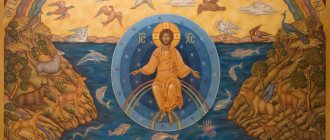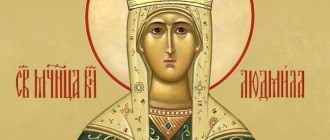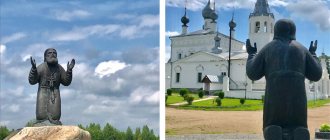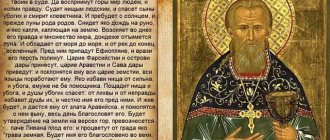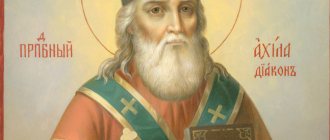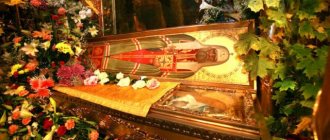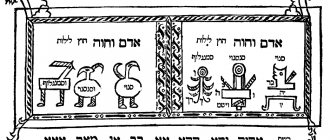Idleness
“Lord and Master of my life, the spirit of idleness... do not give it to me.”
The first thing we ask the Lord is not to give us a spirit of idleness. What is idleness? And why did Saint Ephraim pay special attention to this human vice? Idleness should not be confused with free time, with what in our everyday life we call a day off. This day is given to us according to God’s commandment in order to have a rest from the work that we do during the week. During this day a person rests, and rest is not idleness. Our human body is designed in such a way that without rest it cannot work for a long time; processes dangerous to health can begin in it. Therefore, it is no coincidence that the Lord established the seventh day as a day of rest and rest.
But idleness is something else. We say “idle field,” that is, a field that is not sown. In liturgical texts the phrase “idle womb” is found, that is, a womb that does not give birth. Idleness is a kind of emptiness, something that does not produce any fruit, something that has no meaning. All meaning is lost where there is idleness. A person who is in idleness is exposed to very great dangers, because his will is not concentrated, his mind does not work and becomes an easy prey to various external influences. We know that a person commits most offenses precisely when he does nothing, when he is idle, when he is empty. Because emptiness, being in itself dangerous for a person, is not a durable state. The emptiness is always filled with something. In technology and physics there is such a thing as vacuum, that is, complete emptiness. But in order to create a vacuum, special mechanisms, instruments, machines are needed, effort is needed, because vacuum does not exist in nature. Where there is a vacuum, there is death, there is a non-viable environment. If, through our own efforts or through someone’s evil suggestion, we create an emptiness within ourselves, then we commit a most dangerous sinful act, because this emptiness will be occupied, unnoticed by us, by such forces that can easily take power over us.
It is known that many vices stem from idleness. People have gathered, there is nothing to talk about, there are no special interests, and in order to brighten up their time, they abuse alcohol or do lawless things, which often end in crimes. Nothing to do! Idleness!
A believer cannot have idleness, there cannot be emptiness by definition, because for every idle word we will give an answer before God (see Matt. 12:36), and for our emptiness we will give an answer before God, like barren fig trees (see Mark 11:12-14, 20-21). In order to avoid this dangerous, harmful condition, we must stay awake. And the Lord calls us to this vigilance.
We must especially stay awake during Lent, which is given to us so that we evaluate our spiritual state, think about who we are, what state we are in, where we are heading our way, what we are doing and what we can do. If we ask ourselves such questions, then they should lead to specific actions, to the desire to correct our path in life. And if a person corrects his life path, then he first of all controls himself. Then there can be no idleness, because a person who cares about his mental, moral, spiritual development will certainly use every opportunity to ensure this development.
It is no coincidence that the holy fathers especially emphasize the danger of idleness as a destructive vice for a person. In the Church, especially during the days of Holy and Great Lent, we have the opportunity, after analyzing our condition, to do everything we can do in order to stop the development of dangerous vices, among which in the first place is idleness. And may the Lord help us to devote the days of the Holy Pentecost to overcoming our weaknesses, vices and sins.
Who is Ephraim the Syrian?
Reverend Ephraim is a saint of the Orthodox Church who lived in the 4th century in Syria.
Ephraim the Syrian is numbered among the Fathers of the Church. Largely, for his rich spiritual heritage in the form of ascetic books, sermons and psalms.
See also: Ephraim the Syrian - short life
See also: who are the holy fathers?
Dejection
In the prayer of Saint Ephraim the Syrian, we ask the Lord to protect us, first of all, from idleness, for idleness is a vice that destroys human life. And then follows a prayer to God to deliver us from despondency.
There are probably no people who have not experienced this feeling in their lives. Saint John Climacus says that despondency is relaxation of the soul and exhaustion of the mind. Dejection is accompanied by a difficult state of mind: it seems to a person that he cannot do much, cannot achieve much, and has lost a lot in his life. And this negative self-esteem can be so destructive that people lose their presence of mind, the ability to work actively, realistically assess the events around them, and really fall into a difficult state of mind.
Sometimes sadness is confused with depression. The external manifestations of both are quite similar. But if depression is the result of mental ill-being, that is, a consequence of illness, then despondency is not such. The concept of “despondency” can generally be defined and described only in the system of religious coordinates. If a person loses faith in God, if he begins to doubt many things, if he loses certain life coordinates associated with his religious choice, then, as a consequence, despondency sets in, a difficult state of mind.
Dejection cannot be treated with medication; it is impossible to get out of despondency through suggestion from the outside. This is a state that can only be overcome by man himself, relying on the power of God. How is it possible to accomplish such a feat? There are two indispensable conditions: a person must believe in God and believe that everything that happens to him is ultimately the action of Divine providence - either God’s permission, if what is happening is mournful and sad, or a manifestation of Divine mercy, if something joyful and sad happens. Kind. When a person learns to surrender himself into the hands of God, despondency disappears, because instead of despondency, the deepest confidence in the power and intelligence of Divine Providence is gained.
I had to meet people who went through the most difficult life, including those who went through imprisonment, exile, and camps only because they believed in God. And here’s what’s amazing: these people never had despondency. While still serving obedience in Smolensk, I met one person. He visited me, recognizing my last name, and said that with some young man who bore the same last name, he sailed from what was then Leningrad to Nagaev Bay, and then was taken along the Kolyma highway to the place of detention. And he said that that young man was never in a bad mood - he always remained calm, peaceful and even joyful. And when he was asked why he was in such a good mood, the answer was simple: “But for the sake of Christ I go where they send me. Can life be bad for Christ’s sake?”
We need to reconsider in many ways our attitude towards the world around us, towards ourselves. The more comfort there is in life, the more material opportunities, the weaker a person becomes. He has something to lose, he is afraid to reduce his level of consumption and comfort and therefore becomes very vulnerable. And not only because excitement takes over at the mere thought that life can change for the worse, but also simply because very often such a person becomes despondent. And despondency is where faith disappears and where fear takes the place of faith.
That is why in the prayer of St. Ephraim the Syrian, the request to the Lord to deliver us from despondency is in second place - the need to get rid of despondency as a mental state incompatible with genuine human well-being is especially emphasized.
Each of us, to one degree or another, under certain circumstances, is susceptible to this feeling. And for each of us who has been subject to this feeling at least once, today the heartfelt words of the prayer of St. Ephraim the Syrian sound with a request to save us from despondency. And getting rid of despondency means changing your outlook on life, parting with fears, parting with bewilderments, parting with attempts to see the future without having any opportunity to really do it. This means surrendering into the hands of God with complete trust in the Lord, without any fear, but with great hope in God’s mercy.
The prayer of St. Ephraim the Syrian teaches us all this. And, repeating these words, we will ask the Lord to deliver us, among other things, from pernicious despondency and give us the opportunity to find joy and peace in our souls.
Inquisitiveness
Through the prayer of Saint Ephraim the Syrian, we ask the Lord for help on the paths of our spiritual life. We ask you to protect us from feelings, thoughts, and actions that destroy a person’s inner world and interfere with the work of salvation.
“Lord and Master of my life, the spirit of idleness, despondency, covetousness... do not give me.” Least of all do we pay attention to the danger of covetousness, because everyone feels guilty before God in idle talk and despondency, but the tendency to covetousness remains invisible to the majority. But in fact, covetousness is a very painful passion, and a sinful passion. In Russian, lust for power is called lust for power. When a person strives for power, then he is overwhelmed by the passion of lust for power.
Only the Lord has power over the world and over every person, and the ancients understood this well. From the Old Testament we know that in Israel, which rightfully considered itself the chosen people, initially there were no kings. Israel placed itself under the authority of God; In history, such government is called theocracy, translated into Russian - the power of God. But since someone had to exercise this power, the ancient Israelites established a special ministry - the ministry of judges. Not being kings, the judges performed certain functions related to the management of the state, remembering, like the entire people, that the true Ruler, the true King of Israel is the Lord. But at some point, the Israelis felt that the peoples living around them, who had kings and had a fairly organized statehood, were beginning to rise above the Israelis, which was especially felt during military operations. The people of Israel arose the idea of the need to have a king. The last judge was the prophet Samuel, and the people demanded from him that a king be elected and thereby end the reign of spirit-bearing men over Israel, who, without having royal powers, were rather moral authorities and spiritual leaders. Samuel turned to the Lord in prayer and heard the answer: “They did not you - they rejected Me” (see 1 Samuel 8:7-8). And God gave them King Saul.
Power attracts people because, through its possession, one can fulfill one’s own will through other people, and implement one’s will in the lives of others. This opens up enormous opportunities for achieving goals that would be completely unattainable if you relied only on your own will and strength. Power gives the right and opportunity to mobilize the will and strength of many to achieve the goals that the person in power sets for himself.
That is why unworthy people often strive and continue to strive for power. If a worthy person is awarded power, he directs it to achieve goals that serve the good not only and not so much of himself, but of all those for whom he exercises this power, that is, for the sake of the people. People feel and respect such rulers, surround them with respect, and consider them great authorities. Thus, in the history of our state, many kings were surrounded by respect and had the highest authority. For the people realized that the sovereign, being at the head of the country, gave all of himself to serve the Fatherland. And we know that many of our worthy rulers were killed precisely because they selflessly served their people.
But power can also manifest itself in the worst possible way when it serves the interests of one person or group of people, when in the name of narrow corporate interests and goals the forces of the people are strained, who are forced by the authorities to do what serves the good of the few. There have been such times in the history of our Fatherland - difficult times, marked by significant problems in the life of the country and the suffering of people.
Lust for power is a sin, and power is justified only when it serves the only purpose - to benefit people, to serve people. The word "minister" denotes a high official in the state. But translated from Latin, a minister is a minister. There can be no other purpose for a person in power other than to serve the people.
Everything that we are talking about now concerns not only secular power, but the same applies to spiritual power even to a greater extent than secular power. In the Church there cannot be power aimed at achieving the personal goals of the one who has this power. In the Church, power is synonymous with service. The more powers a clergyman has, the more he must crucify himself on the path of serving God and people. And this is the only justification for the respect, the authority and the gratitude that the believing people pay to their servants.
And today, thinking through the words of St. Ephraim the Syrian’s prayer for power, asking the Lord to deliver us from the lust for power, we must clearly understand that everything said applies not only to those who have power, but also to each of us. Because even in the simplest interpersonal relationships, very often one person tries to get the upper hand over the other, sometimes consciously, and sometimes unconsciously, due to character traits and volitional qualities. And this desire to be above another, to influence another, to control another is also nothing more than a lust for power, albeit without real power. Probably, most of us, if we look more closely into the depths of our souls, will see this vice in ourselves, otherwise St. Ephraim would not have included in his great prayer an appeal to the Lord with a prayer to deliver us from this sin and vice.
Let the power of God and our own efforts eradicate from our lives every desire for power, every desire to dominate another person. And those who have certain powers of authority must be fully aware that the main meaning and only goal of such responsible service is nothing more than serving God and people.
Repentance - what is it?
Repentance is not self-flagellation, but a desire to build your life in a new way.
Self-reproach is necessary, but it can easily become meaningless if a person does not have an image to strive for. And the image to which man and his soul strive is the image of a holy man.
The appearance of a saint is the appearance of a person who is devoid of passions and vanity. Only the saints have a life filled with meaning, purpose and completeness, because the source of their life is God Himself, the Creator, and with Him everything is new all the time and everything has meaning.
Repentance is a person’s attempt to come into contact with this image. Do everything to rid yourself of thoughts about a hectic life that do nothing but senselessly agitate the spirit and soul. Repentance is a sincere desire to begin to live in a new way: according to the Commandments and according to the Plan of God inherent in every person.
And the prayer of Ephraim the Syrian incredibly accurately describes this desire - denoting everything basic and not adding anything superfluous.
See also: Repentance - what is it?

